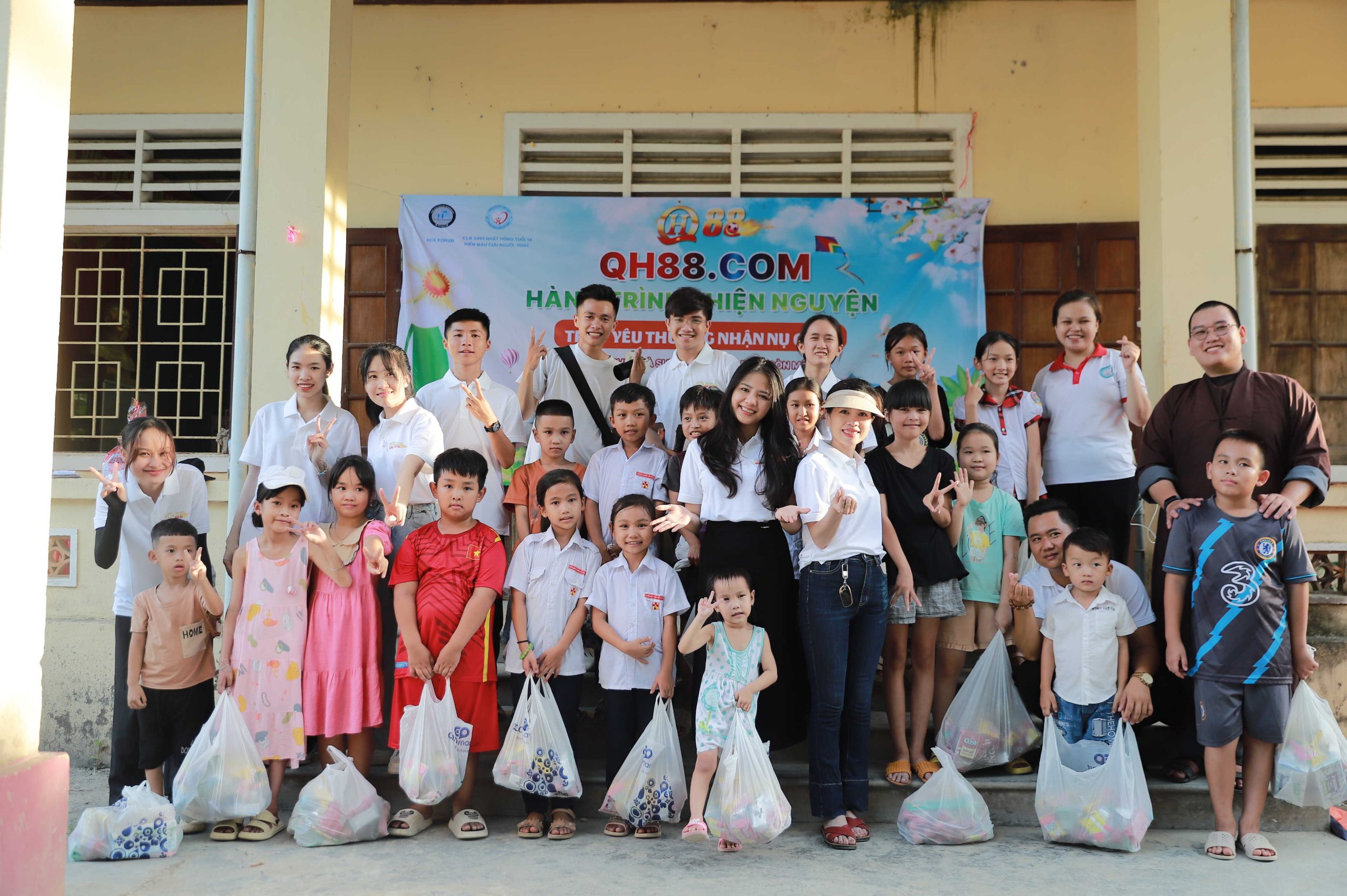Hành trình thiện nguyện của công ty QH88 trên mọi miền đất nước
Thời điểm vừa qua công ty QH88 đã luôn tạo ra nhiều buổi thiện nguyện giúp cho người dân ở trên toàn quốc. Với mong muốn được gửi đến mọi người các món quà ý nghĩa cũng như trao gửi động lực cho mọi người có thể vượt qua được hoàn cảnh khó khăn. Để cùng chung tay góp sức và giúp đỡ cho những mảnh đời bất hạnh nên công ty QH88 thường cho tổ chức nhiều buổi từ thiện đến với nhiều vùng miền khác nhau để trao các món quà nhỏ đến mọi người.

Những đứa trẻ khuyết tật mang trong mình nhiều khiếm khuyết về cơ thể cũng như không được hoàn toàn lành lặn giống với những người bình thường, do đó họ cần rất nhiều về sự cảm thông cũng như chia sẻ. Những đứa trẻ này còn bất hạnh hơn đôi khi các em còn quá nhỏ nhưng phải gánh chịu nhiều nỗi đau về thể xác lẫn tinh thần.
Đặc biệt tại mái ấm của chùa Bảo Long, đến đây chúng tôi đã nhìn thấy được những đứa trẻ rất tội nghiệp bởi các bé phải chịu nhiều khiếm khuyết khác nhau. Bắt gặp ở đây nhiều đứa trẻ vừa sinh ra thì đã bị khuyết tật nên bị gia đình bỏ rơi không nhận nuôi, những đứa trẻ mãi chẳng thể biết được cha mẹ của mình là ai hay quê quán ở đâu.
Nhân viên tại QH88 mãi không bao giờ quên được ánh mắt trong veo cùng nụ cười hiền lành của những đứa bé khuyết tật tại đây. Hình ảnh đứa trẻ không thể nhìn thấy được ánh sáng như mọi người, cũng như chẳng thể cảm nhận được khung cảnh diễn ra hay không thể nào nhìn được hình ảnh mọi người xung quanh đang vui chơi. Khoảnh khắc đó dường như trong tim chúng tôi bị trầm đi một nhịp, đã không có một gia đình trọn vẹn ấy vậy mà cũng không thể có được cơ thể trọn vẹn như bao người khác.

Hiện Trung tâm Bảo trợ trẻ em mồ côi khuyết tật ở chùa Long Thọ được đặt tại vị trí 393 đường Bùi Thị Xuân, phường Thủy Biều thuộc thành phố Huế, với phạm vi hoạt động ngay tại địa bàn tỉnh Thừa Thiên Huế. Ngoài ra, còn có chức năng và nhiệm vụ đó là tiếp nhận các đối tượng là trẻ em khuyết tật có mặt trên địa bàn tỉnh Thừa Thiên Huế.
Mang một tinh thần lá lành đùm lá rách chính điều đó mà công ty QH88 đã mang đến cho những em bé tại đây những món quà cùng nhiều món đồ chơi dành cho những em bé sơ sinh. Giúp cho các em có thêm nhiều niềm vui và động lực để có thể phấn đấu cố gắng hơn trong cuộc sống.

Vượt qua một đoạn đường dài đến những khu vực vùng sâu vùng xa, quá trình đi lại có khó khăn cũng không thể nào làm cho những thành viên trong công ty QH88 nản chí. Khi vừa bước đến những nơi xa thành phố ở các vùng núi và được lắng nghe thêm nhiều câu chuyện của những họ gia đình.
Làm cho những thành viên cảm thấy hiểu thêm nhiều điều mà người dân đang ở các khu vực này họ đang phải trải qua. Những người ở các vùng nguy hiểm luôn bị rình tập hoặc bị tách biệt ra cuộc sống đất liền, hay những mảnh đời gặp phải nhiều biến cố và thiếu thốn đủ bề trong cuộc sống mỗi ngày làm cho đời sống họ phải khó khăn thêm gấp bội lần.
Những em nhỏ tại đây tuy thiếu thốn rất nhiều thứ từ đồ ăn thức uống đến cả việc sinh hoạt mỗi ngày cũng không được như các bạn nhỏ hiện nay. Nhưng các em vẫn rất vui vẻ, hồn nhiên, vẫn luôn nhỏ những nụ cười thơ ngây, đùa giỡn cùng đội thiện nguyện công ty QH88.
Bắt trọn từng khoảnh khắc hạnh phúc và thích thú của các em khi được nhận những món quà gửi đến các em. Đặc biệt, công ty đã trực tiếp đến thăm và tặng các phần quà cho những hộ gia đình khó khăn trong khu vực, đến nơi các thành viên càng thêm bồi hồi vì cuộc sống khó khăn của nhiều gia đình nơi đây.
Để động viên cũng như giúp đỡ các phần quà như 30 phần quà gồm bì thư, gia vị và gạo cho người lớn; cùng với các món quà về bánh kẹo, vở bút, dụng cụ học tập, 5 thùng sữa, hoa quả và 50 bì thư cho các bé nhỏ. Để giúp cho cuộc sống của họ có thể thêm động lực nhỏ bước tiếp trong cuộc sống này.

Với phương châm thực hiện “Giúp đỡ thật đúng người và đúng hoàn cảnh”, cùng với một khoản ít lòng thành các thành viên trong công ty QH88 và việc thường xuyên kêu gọi thêm nhiều tổ chức, nhà hảo tâm cả trong và ngoài nước cùng chung tay ủng hộ đến các mảnh đời có hoàn cảnh khó khăn với nhiều hình thức khác nhau.
Vì thế sự hỗ trợ tùy theo hoàn cảnh mỗi gia đình, cũng như mỗi đối tượng. Trung bình mỗi đợt công ty sẽ cho tổ chức đi trao tặng tiền, quần áo, gạo… đến từng khu vực khác nhau.
Giám đốc công ty đã từng chia sẻ rằng: “Tôi tham gia và tạo nên nhiều chương trình từ thiện và chia sẻ sự kiện đến với nhiều người để có thể giúp được thêm nhiều người ở nhiều khu vực khác.
Không chỉ vậy, trên cơ sở là cầu nối từ nhiều mạnh thường quân với các người nghèo ở toàn quốc. Mỗi khi đến để giúp đỡ được một gia đình, đối tượng, bản thân tôi cũng như các thành viên đều cảm thấy rất vui vì đã có thể làm được một việc rất có ích cho đời”.

Hoạt động thiện nguyện tại trung tâm bảo trợ trẻ em khuyết tật tại chùa Long Thọ
Ắt hẳn ai trong bất cứ chúng ta đến lúc trưởng thành đều mong muốn sẽ được quay về quãng thời gian của tuổi thơ, được sống ở tháng ngày vô cùng thoải mái, vô tư và không cần phải bận tâm suy nghĩ, không lo muộn phiền đúng không? Nhưng liệu rằng tuổi thơ của những em nhỏ này cũng sẽ có được đầy ắp kỷ niệm vui tươi và no đủ như thế được?
Với ước mong có thể tạo ra được những đoạn ký ức tuổi thơ tô màu sắc tươi đẹp, đem đến nụ cười cũng như niềm vui cho các em bé tiểu học nơi đây, công ty QH88 quyết định tổ chức chương trình thiện nguyện tại trung tâm bảo trợ dành cho trẻ em khuyết tật tại Chùa Long Thọ.

Thoáng nhìn qua một khung cảnh khác thì lại bắt gặp nhưng đứa bé tay chân không được như người thường, mỗi lần các em muốn di chuyển hoặc cầm nắm bất cứ điều gì cũng rất khó khăn. Thương các em vì còn quá nhỏ mà đã phải chịu đựng quá nhiều nỗi đau. Nhưng các em lại cho đoàn chúng tôi thấy các em rất vui vẻ, những nụ cười từ các đứa trẻ đã làm cho những giọt nước mắt của mọi người đôi khi phải rơi xuống.
Hiểu được cũng như cảm nhận được nỗi khổ của những đứa trẻ nhỏ bị khuyết tật tại đây, QH88 đã có sự cảm thông cùng với sự sẻ chia xã hội xây dựng lên một hành trình thiện nguyện giúp đỡ cho những bé tại chùa Bảo Long. Với ý nghĩa vô cùng to lớn và có giá trị cao cả dành cho mỗi người xung quanh ta, đặc biệt là với người khuyết tật.
QH88 mang đến cho các em rất nhiều món quà để chia sẻ niềm yêu thương đến các em như trao tặng tiền mặt, 200 kg gạo, 18 thùng sữa cùng với nhiều đồ chơi để các em có thể vui chơi, còn có cả tập vẽ, bút màu, bút chì… cho những em có thể học vẽ. Ngoài ra, công ty QH88 còn mang đến cho các em thêm những cây quạt và có cả hoa quả trái cây, gia vị để phục vụ bếp ăn nấu cho các trẻ ăn mỗi ngày.

Hành trình thiện nguyện trao yêu thương tại phường Hương Vân thị xã Hương Trà.
Vào ngày 13/6/2023 Công ty QH88 đã có mặt ở Hương Vân thị xã Hương Trà để viết tiếp lên một hành trình mang tên “Trao yêu thương, Nhận nụ cười”. Một ngày của các nhân viên của QH88 đã đặc biệt trao gửi các món quà ý nghĩa đến nhiều hoàn cảnh còn khó khăn và vất vả, giúp cho mọi người có thêm động lực để có thể vươn lên trong cuộc sống.
Với mục đích rằng có thể chia sẻ cũng như đồng hành cùng với cộng đồng, bước tiếp chặng đường thiện, công ty QH88 đã đến các khu vực vùng sâu để trao nhiều phần quà gửi đến các gia đình có hoàn cảnh khó khăn.

Chính mỗi chúng ta sẽ là những người đi gieo các hạt mầm của hạnh phúc. Mầm xanh cũng từ đó có thể kiên cường vươn lên để đón nắng và phát triển thành cây, và được tự mình bắt đầu đơm hoa kết trái ở trong một môi trường tốt nhất theo cách riêng ở mỗi cá thể mỗi người.
Những nụ cười vô cùng rạng rỡ bởi niềm vui và nhiều điều hạnh phúc nhỏ bé đó là những món quà ý nghĩa hơn bao giờ hết mà những người thiện nguyện tại QH88 nhận được từ chính các đứa trẻ và mọi người dân tại đây.
Mỗi con người sẽ có mỗi hoàn cảnh cùng với mỗi mảnh đời hoàn toàn khác nhau, cuộc sống dẫu có công bằng hay nó không công bằng với ta thì khi tạo hóa cũng đã ban tặng cho mỗi người chúng ta những điều được coi tốt đẹp nhất, may mắn nhất.
Đặc biệt đã được hơn rất nhiều so với các mảnh đời còn kém may mắn hơn chúng ta. Do đó mọi người hãy cùng chung tay, cùng thực hiện góp sức mang đến nhiều điều ý nghĩa, thêm nhiều niềm vui nhỏ trong cuộc sống…để những mảnh đời không được may mắn như ta, cảm nhận được cuộc sống này vẫn rất hạnh phúc và cực kỳ tươi đẹp hơn bao giờ hết.

Một ngày thiện nguyện thoáng trôi qua thật nhanh. Nhưng những điều đọng lại trong tâm trí của nhân viên công ty QH88 thật sự rất sâu sắc. Cũng không phải điều gì quá lớn lao, chỉ là mọi người đều nhận ra: hãy cứ Cho đi với cái tâm thật yên, những gì bạn Nhận được sẽ thật nhiều. Những điều nhận được ấy có thể không hữu hình để ta cân đo đong đếm được, nhưng đôi khi chỉ đơn giản là một nguồn động lực mạnh mẽ cũng là món quà vô cùng to lớn rồi, phải không?
Mỗi năm công ty đều tổ chức một chuyến thiện nguyện dành cho các thành viên công ty QH88. Đây là dịp để mọi người có những bài học về Cho và Nhận; cũng là dịp để có thể thấu hiểu những người xung quanh mình hơn.
Qua những dịp như thế, mỗi thành viên lại cảm nhận về mối gắn kết với nhau mạnh mẽ hơn. Và mong rằng sẽ có thể đến với nhiều mảnh đời khó khăn khác để trao tặng và giúp đỡ họ có thêm nhiều niềm tin hơn trong cuộc sống này.
Kết luận
Công ty QH88 đã đưa ra một tâm niệm đó là” Việc làm từ thiện chính là đức hạnh xuất phát từ con tim của mình chứ không phải xuất từ đôi tay”. Cũng như chúng ta cho đi thì sẽ còn mãi ở đó. Hy vọng với sự chia sẻ trên của QH88 family những đứa trẻ, và các hoàn cảnh khó khăn có thể ngập tràn niềm vui và sức khỏe để cùng đón nhận thêm nhiều sự quan tâm và yêu thương từ nhiều người.





